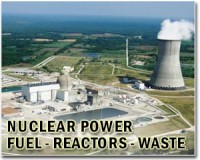 |
Tehran (AFP) Oct 18, 2009 Iran will enter Vienna talks with the major powers on Monday seeking a guaranteed supply of 20 percent enriched uranium and insisting it will make up any shortfall by domestic production, officials say. Iranian analysts say Tehran will also attempt to allay concerns over its nuclear programme, which Western governments suspect is cover for a drive for a bomb, something the Islamic republic denies. Officials from Iran, the International Atomic Energy Agency, France, Russia and the United States will meet in Vienna to discuss how to provide the 20 percent enriched uranium needed for a research reactor in the capital Tehran. Iranian media say the talks could run on into Tuesday. The meeting is the fruit of October 1 talks in Geneva, at which Iran agreed to ship 3.5 percent low-enriched uranium abroad for further purification and subsequent return to Iran. Enriched uranium is the most controversial aspect of Iran's atomic programme, as it can be used as fuel for a nuclear reactor or, in much purer form, as the fissile core of an atomic bomb. "At the Vienna meeting, Iran will seek a guaranteed supply of 20 percent enriched uranium according to a tight timetable," said Mohammad Reza Mohammad Karimi, associate editor of the English-language Iran Daily newspaper. "Iran will go for concrete agreements. If there are no unforeseen hurdles, then the meeting is expected to yield good results." Iranian officials have said Tehran is entering the Vienna talks in a strong position as it could manufacture nuclear fuel on its own if it wanted to. They have warned that if the talks fail, Iran will not hesitate to enrich the uranium itself to the 20 percent purity level required for the Tehran reactor which produces isotopes for medical use. Abolfazl Zohrehvand, aide to lead nuclear negotiator Saeed Jalili, said Iran has the ability to enrich uranium up to 20 percent and may want to achieve 63 percent enrichment, the official IRNA news agency reported. "The current proposal is for enrichment to be done on our territory while only enrichment above five percent, in particular for the research reactor in Tehran, will be done in another country," the news agency quoted him as saying. "The importance of this is that Iran will retain the techniques and technology of enrichment... and we will keep our sites and research centre. "It is possible that in certain circumstances we will need uranium enriched to 63 percent, which we will buy under the supervision of the IAEA or indeed we will do the enriching ourselves," IRNA quoted Zohrevand as saying. Last week, Ali Shirzadian, spokesman for the Iran Atomic Energy Organisation, said the IAEA will be responsible if any such deal fails, and that then "Iran will act directly to supply the fuel for the Tehran reactor." He said Tehran "fully owns the enrichment technology and therefore it will sit at the negotiating table with leverage." He said the Tehran reactor needs 200 kilogrammes (440 pounds) of fuel and the government would prefer to buy it in bulk. An Iranian nuclear official, who declined to be named, told AFP Tehran will discuss the modalities of procuring this fuel on Monday. "It is not difficult to reach an agreement. Our priority is to have this fuel which is for humanitarian purpose," he said, indicating that the Tehran reactor is an internationally supervised research facility. French foreign ministry spokeswoman Christine Fages said last week that Paris hopes the Vienna meeting will facilitate shipping out 1,200 kilos of Iran's low-enriched uranium by the end of 2009 which could "reduce short-term risk that Iran could divert the uranium to a nuclear weapon." The Iranian official said several options will be discussed. According to a recent IAEA estimate, Iran has around 1,500 kilos of low-enriched uranium. The Vienna meeting will be followed by a second round of negotiations between Iran and six world powers in line with the Geneva talks. The date and venue for that meeting has yet to be fixed. Share This Article With Planet Earth
Related Links Nuclear Power News - Nuclear Science, Nuclear Technology Powering The World in the 21st Century at Energy-Daily.com
 France's EDF accused of nuke waste dumping
France's EDF accused of nuke waste dumpingParis (UPI) Oct 14, 2009 Paris is demanding answers from EDF after allegations surfaced that the state-owned energy giant is dumping nuclear waste in Siberia. A documentary broadcast on TV channel Arte Tuesday showed footage of what appeared to be nuclear waste out in the Russian countryside. The report claims that EDF, the world's largest operator of nuclear power plants, ships 13 percent of its spent ... read more |
|
| The content herein, unless otherwise known to be public domain, are Copyright 1995-2009 - SpaceDaily. AFP and UPI Wire Stories are copyright Agence France-Presse and United Press International. ESA Portal Reports are copyright European Space Agency. All NASA sourced material is public domain. Additional copyrights may apply in whole or part to other bona fide parties. Advertising does not imply endorsement,agreement or approval of any opinions, statements or information provided by SpaceDaily on any Web page published or hosted by SpaceDaily. Privacy Statement |